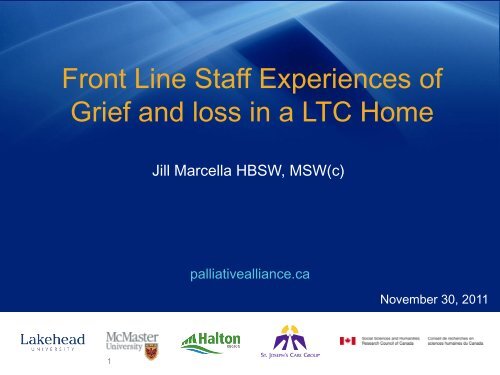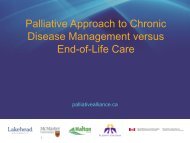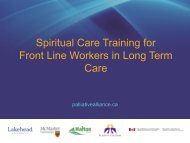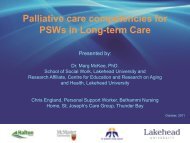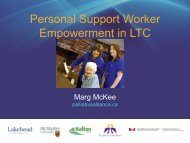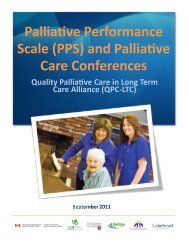Staff Grief and Loss Powerpoint Presentation - Quality Palliative ...
Staff Grief and Loss Powerpoint Presentation - Quality Palliative ...
Staff Grief and Loss Powerpoint Presentation - Quality Palliative ...
You also want an ePaper? Increase the reach of your titles
YUMPU automatically turns print PDFs into web optimized ePapers that Google loves.
Front Line <strong>Staff</strong> Experiences of<br />
<strong>Grief</strong> <strong>and</strong> loss in a LTC Home<br />
Jill Marcella HBSW, MSW(c)<br />
palliativealliance.ca<br />
November 30, 2011<br />
1<br />
palliativealliance.ca
Contributing Research Assistants<br />
Research Assistants Lakehead University<br />
Sue Foster HBSW, MSW ( c )<br />
Denise Groves HBSW, MSW (c)<br />
Stephanie Hendrikson HBSW, MSW<br />
Benjamin Mireku MPH<br />
Robert Sleeper HBSW, MSW (c)<br />
Michelle Uvanile HBSW, MSW (c)<br />
30 November 2011<br />
2<br />
palliativealliance.ca
<strong>Quality</strong> <strong>Palliative</strong> Care in LTC<br />
• Comparative case study design with four LTC<br />
homes as study sites<br />
• Participatory Action Research<br />
• Quantitative <strong>and</strong> qualitative research<br />
methods; surveys, interviews, focus groups<br />
• Participants: Residents, Family members,<br />
Physicians, PSWs, RNs, RPNs, Recreations,<br />
Dietary, Housekeeping, Maintenance, Admin,<br />
Volunteers <strong>and</strong> Community Partners<br />
30 November 2011<br />
3<br />
palliativealliance.ca
<strong>Quality</strong> <strong>Palliative</strong> Care In LTC<br />
• Improve the quality of life for residents in LTC<br />
• Develop interprofessional palliative care<br />
programs<br />
• Create partnerships between LTC homes<br />
community organizations <strong>and</strong> researchers<br />
• Create a toolkit for developing palliative care<br />
in LTC homes that can be shared nationally<br />
• Promote the role of the Personal Support<br />
Worker in palliative care<br />
30 November 2011<br />
4<br />
palliativealliance.ca
Background<br />
• It is estimated that up to 39% of residents<br />
living in Long-Term Care (LTC) are<br />
anticipated to die each year by the year 2020<br />
(Fisher, Ross, McLean, 2000).<br />
• LTC has become a major location of death for<br />
people in Canada<br />
• Formal palliative care programs in LTC<br />
homes that aim to relieve suffering <strong>and</strong><br />
improve the quality of living until a person<br />
dies are rare.<br />
palliativealliance.ca
Background<br />
• LTC homes often do not formally recognize<br />
the grief <strong>and</strong> loss experienced by the front<br />
line staff.<br />
• Due to the nature of the care provided by<br />
front line staff, close relationships form<br />
between staff <strong>and</strong> residents.<br />
• These relationships are sometimes referred<br />
to by staff as “family like”<br />
• The close personal relationships that staff<br />
have with residents contribute to staffs’ grief<br />
at death.<br />
30 November 2011<br />
6<br />
palliativealliance.ca
Background<br />
• The LTC home environment provides little<br />
formal support for front line workers to<br />
manage <strong>and</strong> acknowledge their grief when<br />
a resident dies.<br />
30 November 2011<br />
7<br />
palliativealliance.ca
Purpose<br />
• To underst<strong>and</strong> the experiences of grief <strong>and</strong><br />
loss of front line staff, <strong>and</strong> their perception<br />
of how the LTC home could better support<br />
them after a resident dies<br />
• To create grief support strategies <strong>and</strong> a<br />
policy for promoting workplace wellness<br />
that includes supporting staff grief.<br />
30 November 2011<br />
8<br />
palliativealliance.ca
Methodology<br />
• Individual interviews <strong>and</strong> Qualitative methods were<br />
used to conduct the research<br />
• Nine participants (1RN, 2RPNs, 6PSWs)<br />
• Participants provided h<strong>and</strong>s on end-of-life care to<br />
residents<br />
• Semi structure interviews were audio recorded<br />
<strong>and</strong> transcribed verbatim<br />
• Thematic analysis <strong>and</strong> a process of analytic<br />
induction were used to analyze data<br />
• Themes that emerged from data were agreed<br />
upon by research assistants who had conducted<br />
the individual interviews<br />
30 November 2011<br />
9<br />
palliativealliance.ca
Results<br />
Findings were organized into four<br />
overarching themes that emerged from the<br />
data.<br />
1. The organizational context influences<br />
grief <strong>and</strong> loss<br />
2. The burden of grief.<br />
3. The emotional impact of grief<br />
4. Participant suggestions for grief support<br />
strategies<br />
30 November 2011<br />
10<br />
palliativealliance.ca
Organizational Context Influences<br />
<strong>Grief</strong> <strong>and</strong> <strong>Loss</strong><br />
1. Death is hidden<br />
2. There is no training to prepare staff for<br />
loss<br />
3. Death is part of the job<br />
4. There is a silent culture that exists around<br />
dying<br />
30 November 2011<br />
11<br />
palliativealliance.ca
Death is hidden<br />
• There is little communication around death.<br />
<strong>Staff</strong> often find out that a resident has died<br />
when they come on shift.<br />
• Death is referred to as “letting go” “passing”.<br />
• Death is hidden from residents <strong>and</strong> other<br />
staff.<br />
“ When they die their tag from outside their room goes on the ‘in<br />
memoriam’ board. So that’s how they officially know that the<br />
person is dead. Their tag goes up on the board <strong>and</strong> that’s it, they<br />
don’t have …a little announcement at breakfast…or a moment of<br />
silence at breakfast…”(RPN)<br />
30 November 2011<br />
12<br />
palliativealliance.ca
There is no training to prepare staff<br />
• No information regarding death, grief <strong>and</strong><br />
bereavement during orientation<br />
• Communication is difficult<br />
• <strong>Staff</strong> learn how to manage grief “on the job”<br />
• “There’s noting that I’m aware of that’s in place, <strong>and</strong> the fact that I’m<br />
not aware of it is bad I think, because I think even with orientation as<br />
a new employee you should be told what you can do <strong>and</strong> there’s<br />
nothing…in place” (RPN)<br />
• “Our senior staff are…they’ve been around a long time…they’re the<br />
ones that are teaching us how to deal with everything…you don’t<br />
want to lose that knowledge” (PSW)<br />
30 November 2011<br />
13<br />
palliativealliance.ca
Death is part of the job<br />
• Multiple deaths have an emotional burden.<br />
• There is a hierarchy of emotional<br />
engagement.<br />
• Resources do not match role expectations.<br />
• “We not only have to work with the death <strong>and</strong> dying, we<br />
have to work with the building…it’s a business.” (RN)<br />
• “I guess we’re just expected to be strong <strong>and</strong> we just<br />
have to…accept that it’s gonna happen…We’re always<br />
getting new people in afterwards right? So we just have<br />
to … keep going.” (RPN)<br />
30 November 2011<br />
14<br />
palliativealliance.ca
A silent culture exists around dying<br />
• Lack of openness impacts EOL care <strong>and</strong><br />
response to grief<br />
• <strong>Staff</strong> hold one another accountable<br />
• “I think as PSWs we…do the best we can with what<br />
we’ve got <strong>and</strong>…it’s an inevitable thing…it’s the corridor<br />
to the stairway to heaven…”(PSW)<br />
30 November 2011<br />
15<br />
palliativealliance.ca
The Burden of <strong>Grief</strong><br />
1. No relief from grief <strong>and</strong> loss<br />
2. <strong>Staff</strong> use coping strategies to manage<br />
grief.<br />
30 November 2011<br />
16<br />
palliativealliance.ca
No relief from grief <strong>and</strong> loss<br />
• <strong>Grief</strong> <strong>and</strong> loss are embedded in the nature of the work that is<br />
done in LTC.<br />
• <strong>Staff</strong> learn to detach from residents when a resident dies <strong>and</strong><br />
then have to reattach to new residents or the residents that<br />
they continue to care for.<br />
• There is no control over death <strong>and</strong> staff learn to cope with<br />
loss individually.<br />
• “It’s a hard thing to watch people die…for a living” (PSW)<br />
• “Sometimes we have a resident that dies…<strong>and</strong> two days later there’s<br />
someone in that bed…<strong>and</strong> you’re learning all about somebody new <strong>and</strong> you<br />
haven’t actually…grieved the loss of the last person…but it seems<br />
like…they just keep ‘em comin” (PSW)<br />
30 November 2011<br />
17<br />
palliativealliance.ca
<strong>Staff</strong> use coping strategies to manage<br />
grief<br />
• <strong>Staff</strong> learn to prepare themselves for a<br />
residents death<br />
• Humour is used to manage grief <strong>and</strong> loss<br />
• Relationships are formed between staff<br />
members to help cope<br />
• <strong>Staff</strong> create meaning in talking about<br />
residents<br />
• “If you go in knowing you’re there to make them comfortable<br />
just until they pass away then you mentally prepare yourself<br />
for it. It’ll still hurt, but you’re mentally knowing that person’s<br />
dying” (RPN)<br />
30 November 2011<br />
18<br />
palliativealliance.ca
The Emotional Impact of <strong>Grief</strong><br />
• No formal opportunities for closure when residents<br />
die<br />
• Multiple losses are experienced as staff lose the<br />
relationships formed with residents <strong>and</strong> their<br />
families<br />
• The kind of death, nature of relationship with<br />
resident <strong>and</strong> personal characteristics of staff<br />
members influence how loss is managed<br />
• “There’s no acknowledgement really; we just go on <strong>and</strong> just do your job<br />
which is really sad” (PSW)<br />
• “Because what happens is they become our family...you get close...you<br />
see them everyday <strong>and</strong> all of a sudden it just stops” (PSW)<br />
30 November 2011<br />
19<br />
palliativealliance.ca
Participants’ Suggestions for <strong>Grief</strong><br />
Support Strategies<br />
<strong>Staff</strong> are in the best position to identify the<br />
support <strong>and</strong> resources needed to manage<br />
their grief.<br />
– Formal support<br />
– Education support<br />
– Informal peer support<br />
– Desired protocols after death<br />
30 November 2011<br />
20<br />
palliativealliance.ca
Formal Support<br />
• <strong>Staff</strong> debriefing after a difficult death or<br />
multiple losses<br />
• Organizational recognition of residents’ death<br />
is needed to support staff grief.<br />
• Notification of resident death<br />
• Service of celebration in recognition of<br />
residents’ deaths<br />
• Memory board/tree<br />
30 November 2011<br />
21<br />
palliativealliance.ca
Educational support<br />
• Identified need for education during<br />
orientation<br />
• Access to information for both staff <strong>and</strong><br />
family members on grief <strong>and</strong> bereavement<br />
support<br />
30 November 2011<br />
22<br />
palliativealliance.ca
Informal peer support<br />
• Opportunities for staff to talk amongst<br />
themselves after a resident death<br />
• Peers guiding peers through the grief<br />
process<br />
• Ritual established when a resident dies<br />
• Resident <strong>and</strong> family support<br />
30 November 2011<br />
23<br />
palliativealliance.ca
Conclusion<br />
• The grief <strong>and</strong> bereavement experience of<br />
front line staff is complex<br />
• LTC staff are faced with the presence of grief<br />
daily <strong>and</strong> there are a number of factors which<br />
influence how their experience with grief is<br />
managed<br />
• There are no formal organizational processes<br />
in place to assist staff with h<strong>and</strong>ling their grief<br />
which contributes to them relying on one<br />
another for support<br />
30 November 2011<br />
24<br />
palliativealliance.ca
Conclusion<br />
• Front line staff are in the best position to<br />
identify the support <strong>and</strong> resources they<br />
need to manage their grief <strong>and</strong> loss<br />
• A formal process for supporting the grief<br />
<strong>and</strong> bereavement of staff is needed as a<br />
component of a holistic <strong>and</strong> inclusive<br />
palliative care program in a LTC home.<br />
30 November 2011<br />
25<br />
palliativealliance.ca
Further Information<br />
Visit our website<br />
www.palliativealliance.ca<br />
Contact us<br />
Email: palliativealliance@lakeheadu.ca<br />
Phone: (807)766-7228<br />
30 November 2011<br />
26<br />
palliativealliance.ca


